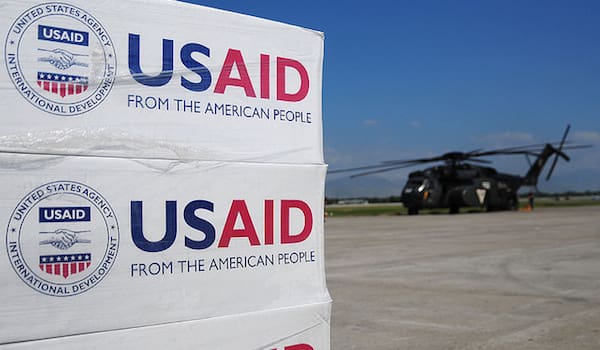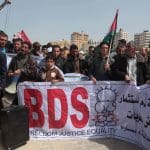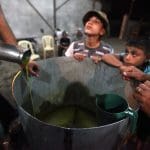
In an important recent piece – Economic Hallucination – Ramallah-based Al-Shabaka policy advisor Sam Bahour exposed the charade played by both Western donors and the Palestinian Authority (PA) to cover up the occupied territory’s inexorable economic meltdown after decades of Israeli military occupation. Arguing that the combined donor-PA approach poses major obstacles to freedom and rights, Bahour concluded: “It’s time for a new economic model, one built on economic justice, social welfare, solidarity, and sustainability.” What would such an economic model look like and how can Palestinians living under occupation move from today’s grim reality to an economy that sustains the quest for self-determination? Al-Shabaka policy advisors Alaa Tartir and Samer Abdelnour join Bahour to debate these questions and explore alternatives.
Needed: Tools to Communicate the Socioeconomic Reality
The Gaza Strip has often been described as a large prison and, indeed, Israel’s siege makes it impossible to portray it as anything else. The West Bank, including East Jerusalem, is also a prison: its entire Palestinian population, from the PA president (whose VIP status was recently downgraded by Israel to a two-month travel permission) to day laborers, are forced to rely on Israel for freedom of movement and access. Israel directly or indirectly controls all Palestinian economic resources. Furthermore, 60% of the West Bank, classified as Area C under the Oslo Accords, is completely off limits to Palestinian development. Yet these West Bank realities are masked by talk of economic “growth” of as much as 9% a year, impressive institution building, and a booming stock market. This harmful narrative is both a result of “people-blind” macro-economic measures and political propaganda that effectively normalizes the occupation-PA-donor status quo.
As Jeremy Wildeman put it in an article on the delusions of a Palestinian economic miracle, “The crippling truth is one of poverty, personal insecurity and protracted economic decline… [only serving] to distract the world from implementing difficult solutions to the real problems.” How difficult are those problems? Rashid Khalidi went to the heart of the issue when he asked how “the settlement-industrial complex” would be uprooted – a complex that stretches beyond the 600,000 settlers living in the occupied West Bank and East Jerusalem to encompass the “hundreds of thousands in government and in the private sector whose livelihoods and bureaucratic interests are linked to the maintenance of control over the Palestinians”.
It should be noted that even those reports that speak glowingly of Prime Minister Salam Fayyad’s institution-building efforts cannot completely escape the truth. Multiple reports by the World Bank, International Monetary Fund, and the European Union, admit that the private sector cannot operate due to the restrictions of the occupation and the shrinking of the Palestinian productive base. One 2010 World Bank report went so far as to say that Israel’s “apparatus of control” had “become more sophisticated and effective in its ability to interfere in and affect every aspect of Palestinian life, including job opportunities, work, and earnings… [turning] the West Bank into a fragmented set of social and economic islands or enclaves cut off from one another.”
Although neo-liberal economic policies accelerated under Fayyad brought wealth and spending power to small segments of the West Bank, this was doomed to be a temporary phenomenon. That has now been replaced with spiraling costs and deficits that the Government is seeking to address through the same kind of austerity measures – public sector downsizing, higher taxes, and reduced incentives for investments – the same kinds of policies imposed upon many developing countries.
Economist Raja Khalidi questioned the applicability of structural adjustment policies to the Palestinian context in a recent article, noting that longstanding financial problems in the OPT have nothing to do with structural problems that can be “adjusted.” Rather, they are the direct result of the occupation. In addition to the volatility of the tax base and the vulnerability of the level of economic activity to the Israeli closure policy and recurrent military confrontations, Israel has full control over the tax and customs clearance revenue that it collects on behalf of the PA. As a report by the UN Conference on Trade and Development (UNCTAD revealed, imports produced in a third country and re-exported to the territories as if they were produced in Israel (indirect imports) cause losses of $480 million USD per year – almost 25% of public revenues, 10% in lost gross domestic product (GDP) and 30,000 jobs per year. The PA’s moves are leading to widespread protests against what has been termed “Fayyadism” and the neo-liberal policies it represents.
Among the challenges for Palestinian economists and analysts are: Which tools and measures might be used or developed to more effectively communicate the reality of the Israeli occupation, from the mundane to the catastrophic in both human and economic terms. For example, is it viable to deduct from rather than add to GDP the costs of construction or consumption related to checkpoints and other forms of mobility restrictions (i.e. jobs to construct roads, extra fuel and transportation services) as well as other costs of the occupation? Similarly, when a student from Gaza cannot study in Birzeit or a person is imprisoned for months or years without charge, what is the negative cost to the Palestinian economy? Such realities do impact Palestinian socioeconomic well-being yet are much more difficult to measure than the cost of expropriated land and resources – which also require measurement in terms of lost socioeconomic, human, and political value. ARIJ, the Applied Research Institute-Jerusalem, estimated that the total measurable cost of the Israeli occupation on the Palestinian economy in 2010 was $6.897 billion, a staggering 84.9% of the total Palestinian GDP in 2010.
There is a need for new measures to factor in not only the cost of the occupation but also the costs of corruption. National and international institutions like the Bisan Centre for Research and Development, ARIJ, the Center for Development Studies at Birzeit University, UNCTAD and the Rosa Luxemburg Foundation do important work and can help to further develop accurate tools for quantifying, and analyzing such costs. It is also important to openly disseminate and discuss these costs widely and build consensus around their findings and potential actions.
Top Priority: Dealing with Aid Dependency
The debates about Palestinian dependence on international aid go back to at least the Nakba (the Palestinian catastrophe of dispossession in 1948). Sophia Stamatopoulou-Robbins’ analysis of past aid initiatives suggests that these bore the “tangible signs of expulsion” and spoke of a common exile. The present is more pernicious because the sources of aid are easily erased together with their implications: “The visible is no longer a reliable source of what is there. Direct imports are not direct. Palestinian police uniforms mean Israeli coordination. And a new ‘Palestinian’ road probably means more settlers.”
Much has been written about the problems of the aid industry in the occupied territories. There is a need to move beyond arguments that aid sustains the occupation and to devise political costs that create a real change. Palestinians must encourage the aid industry to stop wasting resources under the false pretenses of assistance and to help create a genuine economic steadfastness to end the occupation. Donors are aware of the issues but have little incentive to align general development policies with the reality of the Palestinian experience. This is partly due to the unwillingness of donor agencies to defy donor country political agendas, and partly to the global reality that aid policy is highly decoupled from genuine socioeconomic improvement. Added to this is the PA’s acquiescence to the status quo. However, it cannot be ignored that donor countries benefit greatly from the current configuration of the aid industry. This is particularly true of USAID and the Japanese International Cooperation Agency (JICA), whose contractors and consultants consume so much of their own aid. In addition, the recent book by Sahar Taghdisi-Rad reports that a great deal of aid to Palestinians contributes to the Israeli economy. In end, little aid reaches Palestinians; that which does signifies an immense political cost when it ignores inalienable rights to freedom, self-determination, and return.
Donors have never taken Palestinian claims seriously, partly because donor investment in the so-called “peace process” has never been seriously challenged. A civil society campaign is urgently needed to expose these operations and make it difficult for donors to do business as usual. Getting a few “bad” donors out of Palestine as a result of social pressure would go beyond simply “reforming” aid and might restore Palestinian steadfastness and resistance in the struggle for human rights.
Another good starting point along this road would be lobbying to revoke the exemptions the late Palestinian leader Yasser Arafat gave to USAID. According to a 2010 report by AMAN, a Palestinian coalition for transparency and accountability, 146 foreign organizations are registered, just 40% of the total number operating in the OPT. This is partly because Arafat exempted from registration all USAID institutions, branches, bodies and companies, according to the report. Furthermore, the Ministry of National Economy grants many USAID branches registration permits as non-profit companies without requiring the submission of any official documents. They do not have to report or submit budgets, and are not subject to the oversight of the Palestinian Companies Controller. USAID is not the only to operate without registration or oversight. Others include Konrad Adenauer Stiftung, Friedrich Ebert Stiftung Ford Foundation, Handicap International, and Diakonia. Indeed, the author of another study on international aid agencies told Al-Shabaka that one NGO refused to disclose information on the basis that “we are registered by the Israeli government and so you don’t have the right to ask us to reveal any of our information, particularly when it comes to finances”.
The PA should not only demand accountability from foreign NGOs but also tax their operations. A tax on the consultancies of foreign experts will make them more expensive for donors in relation to local expertise. This is fully in harmony with the Paris Declaration for aid effectiveness, as it would promote the utilization of national capacity. Such incentives might help redirect aid to Palestinian employment.
This problem extends to Palestinian NGOs, which now number some 1,500 active organizations. Many refuse to publicly disclose their general assemblies, boards, staff, funders, audited financial reports, bylaws, and even their landlords. Some of the biggest and most important Palestinian NGOs refuse to give any information, claiming that the data is too sensitive. The Palestinian case is not dissimilar, though perhaps not as extreme, to Haiti’s “Republic of NGOs”. Forced to pay for their own freedom from colonization, Haitians were once a people able to feed and clothe themselves.
The Palestinian leadership is partly responsible for the present conditions of economic dependency and continues to suffer from the thinking and consequences of an “economic peace” engendered by the Paris Protocol signed with the Israelis in 1994. Such “peace” has promoted economic normalization through joint industrial zones, Israeli-Palestinian business forums, Palestinian investments in Israel and even in settlements, neglect of the agricultural and industrial base, joint management of water resources for the benefit of Israeli settlements and industry, neglect of Palestinian economic activities in Jerusalem, privatization, and encouragement of public and individual debt. All of the above has occurred alongside increasing entrenchment of Israeli’s colonization of Palestine.
It is vital to address the link between politics, capital and aid. Palestinians must aim to move away from the current context toward a paradigm that understands development as means to realizing rights, freedoms, and self-determination (see, for example, this recent article by economist Ali Kadri). It is also essential to move beyond the technocratic and apolitical understanding of the development process toward recognizing the asymmetry of power and colonial dominance. Many Palestinian writers are touching on different aspects of this dilemma. This body of work needs to be taken a stage further so that it can compete with the existing paradigm and discourse and provide a credible alternative. The status quo only serves to normalize and maintain the Israeli occupation by ignoring the political roots of Palestinian poverty.
Learning from Practical Experience at Home and Abroad
A new Palestinian agenda for a resistance economy can be informed by indigenous, regional, and international experiences. The economic vision must be to reinforce self-sustainability and socioeconomic (as well as cultural) resistance over and above artificial economic growth. Economic growth – as measured, discussed, and applied has become a leash and muzzle. This is not to suggest that private sector development be hindered; entrepreneurship is important at all levels and scales. But there must be a vision for an economy that sits at the heart of the Palestinian struggle.
The first priority must be self-reliance in terms of basic foods. Small-scale agriculture can – and has – been carried out by Palestinians to feed themselves, e.g. permaculture, rooftop drip gardens, and local biodiversity in terms of crops. Taken to scale, this would gradually reduce and eventually end dependence on food aid. It could also serve to reconnect millions of encamped Palestinians to land-based livelihoods. Much can be learned from Lebanese author Rami Zurayk’s work on how Arab agriculture has been undermined by aid and ways to restore indigenous practices (see his recent book Food, Farming, and Freedom and his blog.) Cuba’s experience of achieving food security under politically adverse conditions is also worth studying. Another experience worthy of study is that of the Sahrawis, who managed to organize and administer in exile a highly educated population aligned with their national interests under the most adverse circumstances (see Randa Farah’s recent study).
It is also vital to prevent the PA from undermining Palestinian agricultural potential. Marj Ibn Amer valley in Jenin district has historically been a major food basket for Palestinians, but the PA has commenced actions to establish an industrial zone, whose ability to operate will be fully dependent on Israel, on that land. These attempts are being documented, legally challenged and exposed by BISAN among others. PA officials have been known to laugh when someone talks about the agriculture sector. In fact, the real joke are the official declarations about empowering the people in their land when the land is neither preserved nor used for Palestinian interests.
Traditional cultural industries are another area worthy of support. Exporting Palestinians’ rich cultural heritage (unlike vulnerable cash-crops such as carnations and strawberries) can help educate people globally about the Palestinian cause and provide opportunities to preserve cultural industries.
A Palestinian development agenda should engage Diaspora Palestinians in the struggle for sustainable self-reliance. Palestinians have the experience of the 5% that used to be deducted from the salaries of those working in the Gulf for the Palestine Liberation Organization. The challenge now would be to build the trust of the Palestinians in the Diaspora, to ensure that Palestinian funds for a Palestinian development agenda would not be misused or fill the pockets of corrupted leaders, but would instead be actually managed as bonds by a national development bank or through a national development agency along the lines of the Agha Khan Foundation.
There is also a need to think about how Palestinians can institutionalize and eventually create a bureaucracy around a democratic people-driven development agenda. In the development literature there is a trend that prioritizes the indigenous mechanisms, approaches, and governance for development. In fact, the leading institutions of the first Intifada demonstrated effective Palestinian-centered governance provisions. Unfortunately, these were displaced in the wake of the Oslo Accords.
Importantly, a new Palestinian economic vision must embrace dignity in aid. There must be a time limit by which aid from donor nations supporting any aspect of Israeli military activity is respectfully declined. All international NGOs should agree to work on Palestinian development priorities and timeframes (not three-year donor agendas) and tackle the root causes of Palestinian poverty: the Israeli occupation and resulting restrictions and continuing colonization of Palestine. Transparency in purpose and operations, as well as demonstrated results must be ensured. If we Palestinians do not ensure dignity in our development, no one will.
Sam Bahour resides in Al-Bireh/Ramallah, Palestine. He does business consulting as Applied Information Management (AIM), specializing in business development with a niche focus on the information technology sector and start-ups. Bahour was instrumental in the establishment of two publicly traded firms: the Palestine Telecommunications Company (PALTEL) and the Arab Palestinian Shopping Centers (APSC). He is Co-founder & Emeritus Member of Americans for a Vibrant Palestinian Economy (A4VPE). He currently is an independent Director at the Arab Islamic Bank PLC and a board member at Just Vision. He writes frequently on Palestinian affairs and has been widely published in leading outlets. He is co-editor of HOMELAND: Oral History of Palestine and Palestinians (Olive Branch Press, 1993), tweets at @SamBahour, and blogs at epalestine.ps.
Samer Abdelnour is an academic and activist. He co-founded Al-Shabaka in 2009 and served as a founding board member until 2016.
Alaa Tartir is Al-Shabaka’s program and policy advisor. He is a senior researcher and director of the Middle East and North Africa Programme at Stockholm International Peace Research Institute, as well as a research associate and academic coordinator at the Geneva Graduate Institute, global fellow at the Peace Research Institute Oslo, and governing board member of the Arab Reform Initiative. Alaa holds a PhD from the London School of Economics and Political Science and is co-editor of Resisting Domination in Palestine: Mechanisms and Techniques of Control, Coloniality and Settler Colonialism (2023), Political Economy of Palestine: Critical, Interdisciplinary, and Decolonial Perspectives (2021) and Palestine and Rule of Power: Local Dissent vs. International Governance (2019). He can be followed on Twitter (@alaatartir), and his publications can be accessed at www.alaatartir.com.
















